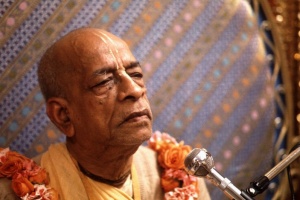SB 6.18.53: Difference between revisions
m (1 revision(s)) |
m (Text replacement - "==== <div class=" to "==== <div class=") |
||
| Line 1: | Line 1: | ||
{{info | {{info | ||
|speaker= | |speaker=Kaśyapa Muni | ||
|listener=Diti, wife of | |listener=Diti, wife of Kaśyapa Muni | ||
}} | }} | ||
[[Category:Srimad-Bhagavatam - Canto 06 Chapter 18]] | |||
[[Category:Bhagavatam Verses Spoken by Kasyapa Muni - Vanisource|061853]] | |||
<div style="float:left">'''[[Srimad-Bhagavatam]] - [[SB 6|Sixth Canto]] - [[SB 6.18: Diti Vows to Kill King Indra|Chapter 18: Diti Vows to Kill King Indra]]'''</div> | |||
<div style="float:right">[[File:Go-previous.png|link=SB 6.18.52]] '''[[SB 6.18.52]] - [[SB 6.18.54]]''' [[File:Go-next.png|link=SB 6.18.54]]</div> | |||
{{RandomImage}} | |||
==== TEXT 53 ==== | ==== TEXT 53 ==== | ||
<div class="verse"> | |||
<div | :striyo vīravatīś cārcet | ||
striyo vīravatīś cārcet | :srag-gandha-bali-maṇḍanaiḥ | ||
srag-gandha-bali-maṇḍanaiḥ | :patiṁ cārcyopatiṣṭheta | ||
patiṁ cārcyopatiṣṭheta | :dhyāyet koṣṭha-gataṁ ca tam | ||
dhyāyet koṣṭha-gataṁ ca tam | |||
</div> | </div> | ||
| Line 17: | Line 22: | ||
==== SYNONYMS ==== | ==== SYNONYMS ==== | ||
<div class="synonyms"> | |||
<div | ''striyaḥ''—women; ''vīra-vatīḥ''—possessing husbands and sons; ''ca''—and; ''arcet''—she should worship; ''srak''—with garlands; ''gandha''—sandalwood; ''bali''—presentations; ''maṇḍanaiḥ''—and with ornaments; ''patim''—the husband; ''ca''—and; ''ārcya''—worshiping; ''upatiṣṭheta''—should offer prayers; ''dhyāyet''—should meditate; ''koṣṭha-gatam''—situated in the womb; ''ca''—also; ''tam''—upon him. | ||
</div> | </div> | ||
| Line 25: | Line 29: | ||
==== TRANSLATION ==== | ==== TRANSLATION ==== | ||
<div class="translation"> | |||
<div | |||
With flower garlands, sandalwood pulp, ornaments and other paraphernalia, a woman following this vow should worship women who have sons and whose husbands are living. The pregnant wife should worship her husband and offer him prayers. She should meditate upon him, thinking that he is situated in her womb. | With flower garlands, sandalwood pulp, ornaments and other paraphernalia, a woman following this vow should worship women who have sons and whose husbands are living. The pregnant wife should worship her husband and offer him prayers. She should meditate upon him, thinking that he is situated in her womb. | ||
</div> | </div> | ||
| Line 33: | Line 36: | ||
==== PURPORT ==== | ==== PURPORT ==== | ||
<div class="purport"> | |||
<div | |||
The child in the womb is a part of the husband's body. Therefore the husband, through his representative, indirectly remains within the womb of his pregnant wife. | The child in the womb is a part of the husband's body. Therefore the husband, through his representative, indirectly remains within the womb of his pregnant wife. | ||
</div> | </div> | ||
__NOTOC__ | |||
<div style="float:right; clear:both;">[[File:Go-previous.png|link=SB 6.18.52]] '''[[SB 6.18.52]] - [[SB 6.18.54]]''' [[File:Go-next.png|link=SB 6.18.54]]</div> | |||
__NOTOC__ | |||
__NOEDITSECTION__ | |||
Revision as of 15:36, 14 November 2018

A.C. Bhaktivedanta Swami Prabhupada
TEXT 53
- striyo vīravatīś cārcet
- srag-gandha-bali-maṇḍanaiḥ
- patiṁ cārcyopatiṣṭheta
- dhyāyet koṣṭha-gataṁ ca tam
SYNONYMS
striyaḥ—women; vīra-vatīḥ—possessing husbands and sons; ca—and; arcet—she should worship; srak—with garlands; gandha—sandalwood; bali—presentations; maṇḍanaiḥ—and with ornaments; patim—the husband; ca—and; ārcya—worshiping; upatiṣṭheta—should offer prayers; dhyāyet—should meditate; koṣṭha-gatam—situated in the womb; ca—also; tam—upon him.
TRANSLATION
With flower garlands, sandalwood pulp, ornaments and other paraphernalia, a woman following this vow should worship women who have sons and whose husbands are living. The pregnant wife should worship her husband and offer him prayers. She should meditate upon him, thinking that he is situated in her womb.
PURPORT
The child in the womb is a part of the husband's body. Therefore the husband, through his representative, indirectly remains within the womb of his pregnant wife.